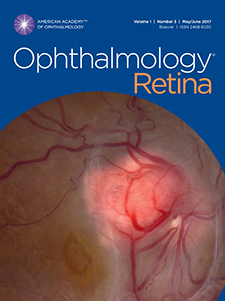Download PDF
WHAT’S HAPPENING
Safety Information for August Solar Eclipse
On Aug. 21, North America will experience a partial solar eclipse lasting 2 to 3 hours. Halfway through the event, a brief total eclipse will be viewable to anyone within a 70-mile-wide path from Oregon to South Carolina. The Academy is gearing up for this event by informing the public about how to safely view the eclipse, and it produced the following resources to help ophthalmologists prepare their patients.
- An EyeWiki page on solar retinopathy.
- An updated EyeSmart page for patients and the public with solar eclipse eye safety information.
- A press release, with safety tips, will be provided at the end of July to media outlets in the path of the total eclipse.
- A downloadable infographic breaking down eyewear and instruments for safe viewing.
Finally, view the patient safety flyer put out by the American Astronomical Society (and endorsed by the Academy).
 |
TELL YOUR PATIENTS TO VISIT AAO.ORG/EYE-HEALTH FOR MORE INFORMATION. EyeSmart, the Academy’s public-facing website for eye health information, has updated its solar eclipse entry in preparation for the Aug. 21 eclipse.
|
2017 Retina Member Survey Results
In April, the Academy sent a survey to 842 retina specialists to gauge which Academy resources are most important to them.
The results. The services most important to these members are the Academy’s advocacy efforts. In addition, the majority of respondents value the Academy’s educational, quality of care, practice management, and patient education resources. Retina Subspecialty Day at the annual meeting, summaries of current literature delivered online, online CME, Preferred Practice Patterns, the IRIS Registry, coding resources, and the Ophthalmology Job Center were cited as the most beneficial.
Sample responses. The end of the survey allowed for open-ended questions and comments for Academy leadership. A selection of these are below, along with the Academy’s responses.
Comment: We have had huge reimbursement cuts in ophthalmology, especially in retina. And the cuts keep coming. It is very hard to meet outcome measures, and, as a result, we are getting penalized. We are not seeing any relief and hope that the Academy will successfully lobby for us.
Academy response: Specialty care is the target of a Medicare campaign to cut costs and ensure that patients are paying accurately for the care they receive.This has resulted in scrutiny of several retina procedures and tests. The Academy led an effort to protect the values for ophthalmic procedures by providing Centers for Medicare & Medicaid Services (CMS) with up-to-date data on direct practice expenses, such as clinical staff labor, supplies, and equipment. This has enabled ophthalmology’s overall Medicare reimbursement to remain stable over the past few years, especially compared with other heavily Medicare-based specialties such as cardiology.
Concurrently, quality program penalties remain a problem for ophthalmologists. That’s why we’re conducting an ongoing campaign on Capitol Hill to halt potential cuts of 10% for 2018 physician reimbursement from these programs, which include the Value-Based Modifier, Meaningful Use, and the Physician Quality Payment System.
Catherine Cohen
Vice President, Governmental Affairs
Comment: As a small subspecialty group, we recognize that it is hard to advocate for our complex patients who require more of our time for diagnosis and treatment (work effort) than that needed for the patients of general ophthalmologists (especially those who delegate postop care following anterior segment surgery).
Academy response: The differences in the complexity that subspecialists experience compared with general ophthalmologists is not lost upon us. That’s why the Academy led an effort to secure new taxonomy codes for ophthalmic subspecialties including glaucoma, oculoplastics, retina, pediatrics, and uveitis. By voluntarily utilizing these codes, ophthalmologists can be evaluated (in the future) on resource use against those with similar patient populations. This will be increasingly important as CMS adjusts its physician payment system to include accounting for the value of care that physicians provide. It is not mandatory for commercial payers to use these taxonomies, but the Academy is working with its sister organizations to educate and encourage their eventual usage. You or your staff should go into the CMS system to start changing your taxonomy—you can begin billing Medicare using the new code after July 4.
For more information, visit Subspecialty Taxonomy Codes.
Catherine Cohen
Vice President, Governmental Affairs
Comment: The IRIS Registry is very helpful for complying with government regulations, but it does nothing to truly improve quality. It just helps us deal with 1 more government mandate that diverts resources from actual patient care.
Academy response: As you noted, the measures reported to the government to fulfill quality reporting do not really pose challenges, and there are no significant gaps for retina specialists. However, this focus on quality measures has led to improvements, such as documenting the severity of diabetic retinopathy and the presence of macular edema and hemorrhage. In addition, communications measures concerning the physician managing the patient’s diabetes care and closing the referral loop have improved the overall care of the patient over time. Finally, the attention to counseling for tobacco cessation and up-to-date medication reconciliation are aligned with overall public health goals and address gaps in care. The IRIS Registry has additional subspecialty outcome measures for retina specialists that evaluate visual acuity loss, disease progression, and success of surgery for patients with retinal detachment, nonneovascular and neovascular age-related macular degeneration, and diabetic macular edema. We will extract these from EHR systems later this year.
For more information, visit 2017 Measures for Merit-Based Incentive Payment System.
Flora Lum, MD
Vice President, Quality and Data Science Division
TAKE NOTICE
Aug. 1 Deadline for IRIS Registry/EHR Integration
You are eligible to integrate your electronic health record (EHR) system with the IRIS Registry in 2017 if:
- you registered for IRIS Registry/EHR integration by June 1, 2017, or
- you had previously registered for the IRIS Registry web portal and then notified the IRIS Registry vendor (FigMD) that you wanted to migrate to IRIS Registry/EHR integration by June 1, 2017.
However, you must integrate your EHR system with the IRIS Registry by Aug. 1, 2017. To meet this deadline, you must:
- be actively involved in the integration process, and
- respond promptly to emails from the IRIS Registry vendor (FigMD).
Training Center Opens in Cameroon
On March 31, the International Council of Ophthalmology (ICO), the Magrabi Foundation, and the “That Every Life May Count” Foundation held the inaugural ceremony for the Magrabi ICO Cameroon Eye Institute (MICEI) in Yaoundé, Cameroon. It is the first not-for-profit subspecialty and training eye hospital in the Central Africa region. The MICEI will train eye health providers; has brand-new state-of-the-art equipment; and offers outreach programs for marginalized populations in Cameroon and the surrounding region. The center received free educational materials from the Academy and is also supported by Seeing is Believing, Christian Blind Mission, Orbis, the Fred Hollows Foundation, and the ICO Foundation.
ACADEMY STORE
Subscribe to Ophthalmology Retina

Ophthalmology Retina helps you stay on top of the growing volume of high-quality retina research and learn about advances in medical drug treatment, surgery, technology, and science.
To subscribe, visit the Academy Store or call (866) 561-8558 (U.S. only) or +1 (415) 561-8540. 8:00 a.m. to 5:00 p.m. PST, Monday through Friday.
MEMBERS AT LARGE
Presidential Award Recipient
On April 20, George M. Bohigian, MD, received the Presidential Award from the St. Louis Ophthalmological Society. The award is given “for distinguished contributions and service to the ophthalmic community locally and worldwide.” Dr. Bohigian is a professor of clinical ophthalmology in the department of ophthalmology and visual sciences at the Washington University School of Medicine in St. Louis, Missouri.
Passages
Roger F. Steinert, MD, surgical innovator and celebrated teacher, passed away on June 6. He was 66.
Dr. Steinert was a lauded expert in cataract, cornea, and refractive surgery. He was the Irving H. Leopold Chair of the department of ophthalmology and founding director of the Gavin Herbert Eye Institute at the University of California, Irvine (UCI).
After he received his medical degree from Harvard Medical School and trained at Massachusetts Eye and Ear, he worked at the Massachusetts Institute of Technology before returning to Harvard as a clinical instructor and, later, as associate clinical professor of ophthalmology. In 2004, he joined UCI as vice chair of ophthalmology, and, beginning in 2005, he served concurrently as professor as biomedical engineering.
His many accomplishments include the Lifetime Achievement awards from the Academy and International Society of Refractive Surgery, the Dohlman Award for Teaching Excellence, the Ophthalmic Innovation Summit Innovator Award, and his tenure as president of the American Society of Cataract and Refractive Surgery. In addition to his legacy as a teacher, his contributions to the field include the seminal Cataract Surgery textbook and more than 200 scientific papers and book chapters.
“Roger was a prince of a person, and his loss is one for our entire profession,” said David W. Parke II, MD, Academy CEO. “He was a skilled clinician and surgeon, a gifted and insightful scientist, and a dedicated steward of his profession. Roger will be remembered by his many, many friends as a genuinely good man who had a keen sense of humor and tremendous laugh and possessed a wonderful blend of professional authority and personal kindness. Our hearts go out to April and his entire family.”
D.C. REPORT
New FDA Commissioner Could Shake Up Regulatory Issues
The arrival of internist Scott Gottlieb, MD, as commissioner of the FDA promises to have a tremendous effect on ophthalmology, as he is a vocal proponent of increased FDA oversight of compounding facilities.
Background. In January, the FDA released new draft guidance on repackaged biologics, proposing a policy allowing longer beyond-use dates to ensure that patients have timely access to biological treatments. These expanded dates put the onus on the facilities that provide these drugs to perform necessary quality testing. However, while larger facilities would most likely be able to meet the stringent proposed testing requirements, smaller compounders could have difficulty meeting them.
The Academy’s stance. Preserving access to sight-saving treatments remains paramount to ophthalmologists and their patients. Based on conversations with outsourcing facilities and other stakeholders, the Academy endorsed the FDA’s plan for expanding biologic beyond-use dates. We are urging the FDA to adopt this revised proposal, which we’ve helped shape through years of education and advocacy to agency leaders.